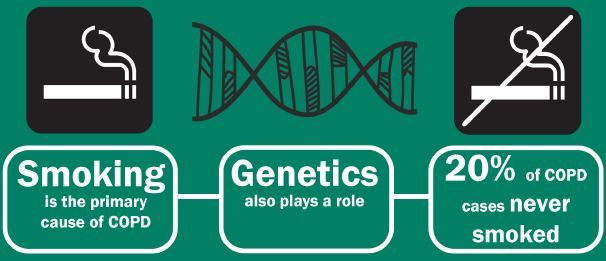COPD Risks 2017: Science Can Predict Your Odds Of Developing Deadly Lung Disease

Scientists may soon be able to predict whether you will develop a disease that is the third deadliest in the world.
A study in Nature Genetics explains that an international team of researchers pored through data from tens of thousands of people to identify dozens of genes that put you at risk for developing chronic obstructive pulmonary disease. And those genes make a big difference — according to the study, the scientists grouped people based upon their degree of genetic risk and found that people in the highest level were 3.7 times more likely to develop COPD than those at the lowest risk level.
When coupled with the risk that smoking cigarettes adds, “this could mean that 72 of 100 smokers in the genetically high-risk group will develop COPD in later life,” the University of Leicester said in a statement.
Read: Predicting If You’ll Survive Lung Cancer
Leicester’s Martin Tobin, a professor who co-led the study, said in the statement that the findings could lead to new drugs that take advantage of the genetic information to treat COPD — including personalized treatments — or be used to better educate people about their risks of developing the disease.
According to the COPD Foundation, the disease name refers to a group of lung diseases that include emphysema, chronic bronchitis and others that cause “increasing breathlessness” as the ailment progresses. People with COPD, which the foundation estimates to be about 30 million people in the U.S. alone, may also cough frequently, wheeze and feel tightness in their chests.
Scientists have previously identified some genetic variants that contribute to the risk of developing COPD, but the new study nearly doubles the number of known genetic variables.
“Given how common COPD is, we know surprisingly little about the reasons why one individual develops the condition whilst another does not,” the University of Nottingham’s Ian Hall said in a statement. “The study of genetic variation between individuals provides a powerful way to understand these mechanisms which underlie disease risk, which in turn will provide a stimulus for drug development.”
According to the University of Leicester, the study results are also a step toward “understanding whether there may be distinct subtypes of COPD in which patients respond differently to treatment.”
Source: Tobin MD, Wain LV, Shrine N, et al. Genome-wide association analyses for lung function and chronic obstructive pulmonary disease identify new loci and potential druggable targets. Nature Genetics. 2017.
See also:
Use Office Plants to Clean Air You Breathe All Day Long
Published by Medicaldaily.com



























